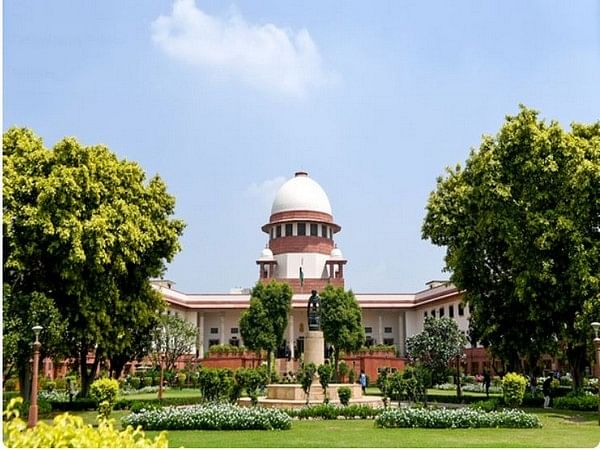New Delhi [India], February 2 (ANI): The Supreme Court has recommended that all courts and judicial forums frame guidelines to ensure that amounts deposited with the office or registry of the Courts or Tribunals are mandatorily deposited in a bank or financial institution.
This direction was issued to prevent litigants from facing any future loss of interest on the amount deposited before the Courts.
A bench of Justices MR Shah and S Ravindra Bhat’s made the observation on Tuesday while disposing of a plea challenging an order of the National Company Law Appellate Tribunal (NCLAT).
“Before parting with this case, this court is of the opinion that all courts and judicial forums should frame guidelines in cases where amounts are deposited with the office/registry of the court/tribunal, that such amounts should mandatorily be deposited in a bank or some financial institution, to ensure that no loss is caused in the future,” the court said.
“Such guidelines should also cover situations where the concerned litigant merely files the instrument (Pay Order, Demand Draft, Banker’s Cheque, etc.) without seeking any order, so as to avoid situations like the present case. These guidelines should be embodied in the form
of appropriate rules, or regulations of each court, tribunal, commission, authority, agency, etc. exercising adjudicatory power,” the court added.
The court was dealing with two appeals against a common order of the National Company Law Appellate Tribunal — the first, by the original homebuyer’s legal representative (complainant) and the second by the builder/developer.
The complainant’s mother-in-law had, in 1989, applied for a flat in a group housing scheme in Ghaziabad, UP. After depositing three instalments towards the flat, she passed away and was succeeded by her daughter-in-law, who deposited the fourth instalment. Thereafter, the developer issued an allotment in the scheme.
Later, her daughter deposited two further instalments.
Eight years later, in December 2001, a demand notice for payment of the eighth and ninth instalments was issued to the complainant. She objected to this notice as there was no intimation about the progress of work and delivery of possession of the flat to her. The developer issued a letter, cancelling the allotment of the complainant’s flat on April 30, 2005. The the complainant deposited seven instalments up to October 4, 1993, she claimed.
The complainant alleged unfair trade practices by the developer and claimed compensation.
However, the developer claimed that the allotment was cancelled due to defaults by the homebuyer in paying instalments.
The Competition Appellate Tribunal passed an order in favour of the complainant and held that
developer had falsely represented to the general public the time within which the project was to be completed but did not complete the construction for more than a decade. The Tribunal directed the developer to pay compound interest to the legal representatives of the complainant.
The COMPAT’s order was challenged by both the complainant and the developer through separate appeals before the top court, which by its order dated 18th July 2017 remanded back to the tribunal to hear it again.
COMPAT, which was abolished in 2017 and its functions taken over by the NCLAT, ordered that the homebuyer was entitled to further compensation for the period from May 1, 2005, till May 7, 2016, as well, since the compensation earlier ordered for was not paid until then.
But the Supreme Court on Tuesday said, “In the present case too, the complainant cannot claim interest from the developer, who had returned the Pay Order. As discussed, at the time of filing
the complaint, she could have chosen one among the various options to ensure that the amount presented to her was kept in an interest-bearing account, without prejudice to her rights to claim interest later. In these circumstances, no equities can be extended to her aid.”
“As regards the complainant’s appeal, the contention is that the impugned order is in error, because the Tribunal ought to have directed that the developer ought to have been directed to pay interest on the sum of Rs 4,53,750/- from October 4, 1993, till the date of its realization i.e., May 6, 2016. This plea is plainly untenable because the interest payable for the past period was concluded in the previous proceedings. The complainant did not point to any rule or binding legal principle which obliged the developer to pay such interest, or justify the direction in the impugned order, by showing how such liability arose in the facts and circumstances of this case,” the court said. (ANI)
This report is auto-generated from ANI news service. ThePrint holds no responsibility for its content.
